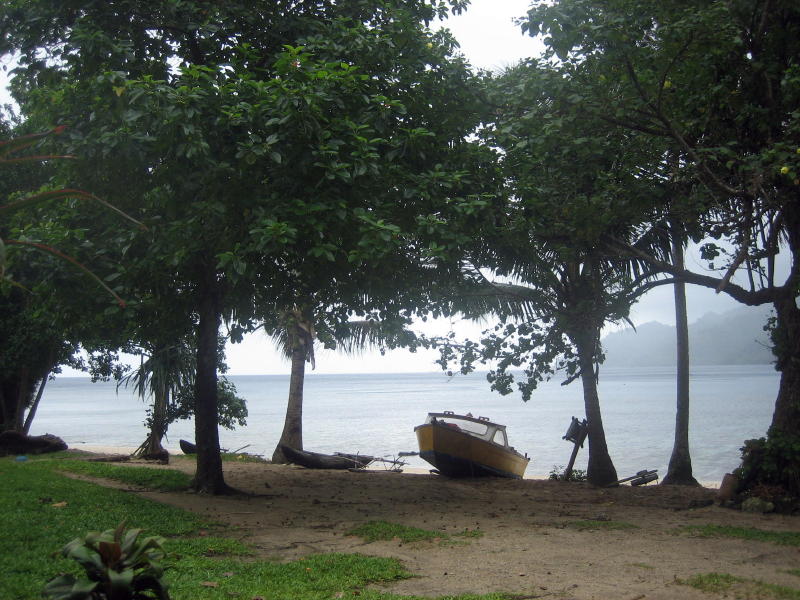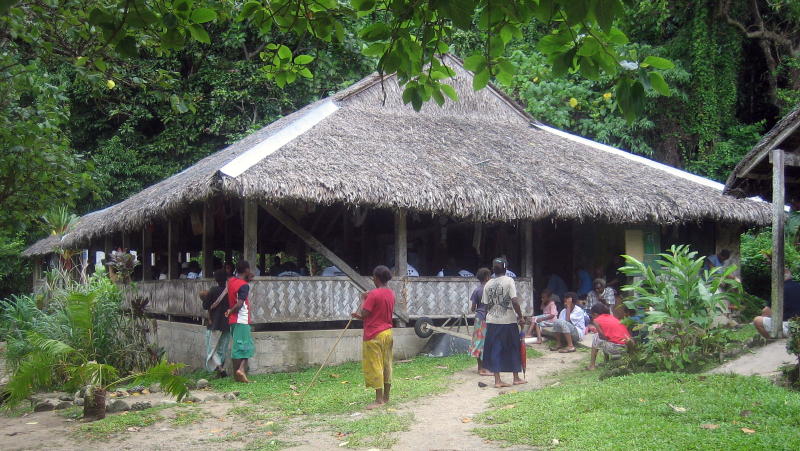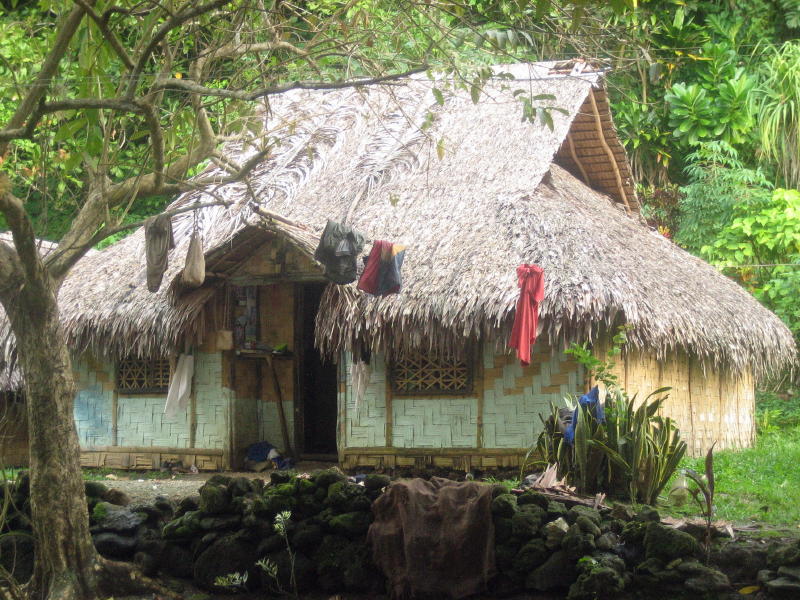Asanvari

JJMoon Diary
Barry and Margaret Wilmshurst
Mon 25 Aug 2008 04:40
|
We are now lying to a buoy within sight
of Luganville, Vanuatu's second largest town, on the island of Espiritu
Santo. Across a strait lies the small island of Aore, which boasts a
very nice resort friendly to yachts. The mooring is sheltered, the
food in the restaurant excellent, there is a laundry service, rubbish
disposal, some internet facilities and a regular ferry service across to the
town. Very comfortable.
On the day before we were due to leave
Asanvari Nelson called us up on his new VHF radio, said the weather
was miserable and due to get worse, and asked whether we would accept his
pressing invitation to join the villagers at a memorial service, a requiem
mass, for four lives lost at sea in May, and a feast afterwards.
He was right about the weather and we said we would. Of the four who
drowned when their small boat was overturned off the reef two or three were
children. We were told that the man in charge had drunk too much kava and
did not see the big wave coming. The ancient tradition out here
is for one hundred days of mourning, after which the spirits
are "let go". It seems to work as well in a Christian
context.
We obtained clear instructions on
timing and protocol and went ashore in the dinghy at 0730 in sheets of
torrential rain - we were drenched, - but there had been a hitch; the
service was delayed. This was no hardship because, having breakfast,
was a campaign team due to speak to the villagers later on behalf of the
Vanua-Aku Pati, one of the parties contesting the general election on
September 2nd. The leader of the team, a retired radio engineer, was very
interesting on the problems facing a small under-developed country with an
expanding economy and rapidly changing culture and an hour passed
rapidly. Only one in four children currently get the opportunity to go to
school and the ballot papers will have to be distinctly coloured and carry
photographs of candidates because not all can read and write.
Eventually Nelson arrived, asked us to
pick up a plastic chair each and led us up and over a very slippery hill to the
church. Fortunately the terrible rain had stopped. The service,
starting at 0900, was in Bismali (pidgin), typically relaxed and laid back
but recognisably Anglican and we could follow what was going on. The
proportion of villagers who attended was probably similar to that in an English
village - we understand from the chief that church attendance is still fairly
strong but not as good as it was in his young days. The choir of nine
lads gave a strong lead, which was a great help. There is
no glass in the windows of the modern building and this was
appreciated by the lads in the choir who found it necessary to lean
out and clear their throats after each whole-hearted contribution.
Everybody except Nelson and us sat on rush mats. It was typical
of the local people's thoughtfulness that our comfort had been considered
beforehand.
 Dug out canoes and small
boat on the beach at Asanvari. The yellow boat shown is similar to the one
that overturned in a large wave last May when 4 people lost their
lives.
After church it was back down the
slippery slope to the club by about 1030 when it was suggested
that we go back to the boat and return at 1200. On our return
the political meeting was in full swing and we thought the team put on a
good show. The villagers generally seemed to be impressed with the
message. Apparently other parties had visited and spent most time
criticising their opponents; these people preached togetherness and harmony
among all the people and this was seen as a superior approach. Also
convinced was JJ Moon's mate; I shall have my work cut out preventing her
from voting on 2nd September. It all went on a bit in the manner of these
things the world over and then it was up and over the slippery hill
again to the big community hut divided into two parts - for men and
women. The women cooked the food
in their section and the men drank kava in theirs.
 The Asanvari Yacht
Club. In the photo it is being used for an election campaign
meeting. So, I have had my first shell of kava,
and pretty ordinary I found it. A great deal of kava is drunk in this part
of the Pacific. It is prepared by crushing the root of a local
plant. I am told that after two shells (halved coconuts) you feel funny
and after three you are away with the fairies. The taste alone will
prevent me from falling into this depravity; kava drinking is unlikely to be
added to the list of my vices. Still, some of us got rather stuck in and
it was a little bit unedyfying but probably no worse than the Rose and Crown on
a Friday night. People were very chatty and I had some excellent
discussions with younger political activists and others while Mags had different
but enlightening talk in her part. During this time the women were cooking
the food in large holes in the ground lined and covered with hot stones.
The menu consisted of a large piece of beef each and two pieces of taro, a
root vegetable the local equivalent of potato. When prepared and cooked it
has a consistency somewhere between mashed potato and bread. After
quite a while the food was distributed in individual woven baskets lined
with banana leaves and hung from hooks off the ground. Afterwards we were
invited to take our basket home. Feeling decidedly peckish I decided to
precipitate matters by asking what was in the baskets and was told it
was the food and "your missus" would have mine. When I asked whether I
could go next door and join her I was told "of course". Not a harem
then. We ate up, said our "thank yous" and got back to the boat about
1630.
We thought it was an wonderful day
sharing real, significant events in the life of the village with the political
contribution a considerable bonus. For us it was probably much more
interesting than the expensive custom dancing and hocus pocus going on at the
same time on Ambrym. We were very grateful to Nelson for his
invitation.
The weather was just as bad the
following day but we left at 0640 and got here in good time without
mishap. We need some provisions, some internet time and some good meals
ashore.
 A traditionally built house
in Asanvari. |